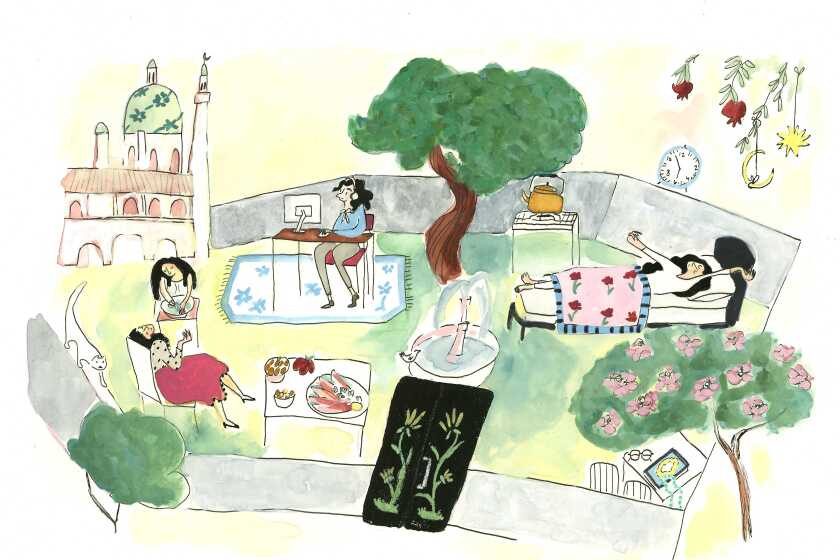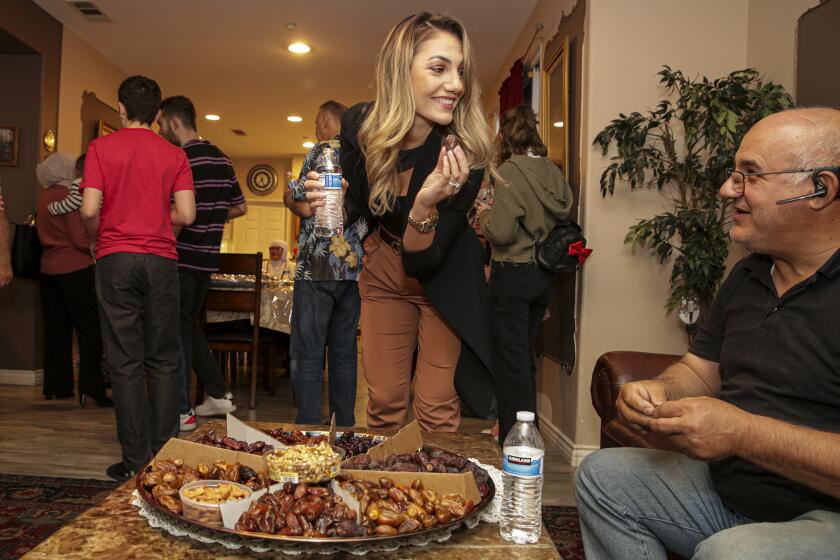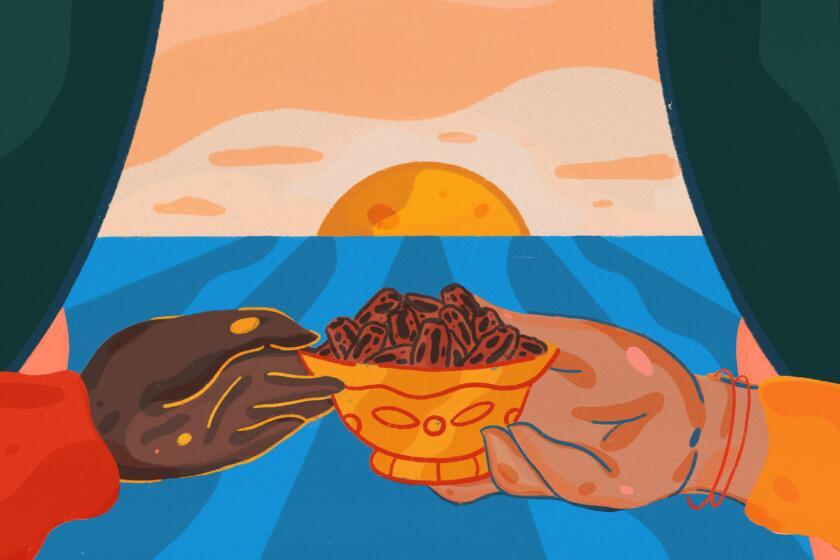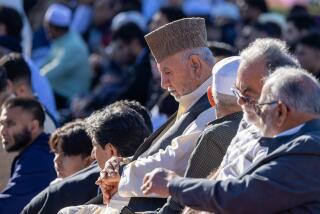Protein, fiber, naps and more fasting tips to avoid getting hangry during Ramadan

Yaz Kubba, a fitness trainer and founder of YazFit, drinks about a gallon and a half of water a day.
She started that about 10 years ago, and the first year, when it came time to fast for Ramadan — when Muslims don’t eat or, often more challenging, drink while the sun is up — she had to adapt.
“So I tried to squeeze in a gallon of water between sunset and sunrise,” she said.
And it worked. She went to work, exercised after and realized she still felt hydrated. “That was definitely a game-changer,” she said.
In the years since, she’s done the StairMaster for an hour, while she was fasting. She’s run up to six miles. “After, my mouth was literally still so watery,” she said.
That doesn’t mean that Ramadan fasting is easy. Kubba normally eats six to eight meals a day, so she jokes that she gets hangry even when she’s not fasting.
“But that’s the whole point of Ramadan, to take your mind off of that and connect with the spiritual experience,” she said.
Here’s a collection of advice from experts on diet, nutrition and wellness about how to be healthy as you observe Ramadan. Though the suggestions are specific to the holy month, much of the guidance is helpful for anyone who’s fasting or just wanting to kickstart a healthier diet.
Faith, fasting, food, entertainment and more. Here’s The Times’ full coverage of Ramadan this year.
Fasting can be beneficial
Fasting kicks our system into a healing phase, said Ussma Ghani, a registered dietitian and holistic nutritionist at Nutriacs.
“Since the day we were born, our [gastrointestinal] tract has been constantly working for us,” she said. “So when we give it a break, we’re allowing for the body to stop, clear out some dead cells and have some time to do some housekeeping or house cleaning.”
Other benefits of fasting can include better blood sugar control, decrease in stress and inflammatory processes in your body, and improving heart health and brain function, said Sumiya Khan, a registered dietitian and co-founder of Sanctuary Kitchen.
But if you’re going most of the day without eating, what you do put in your body is going to have a larger effect on how you feel throughout the day.
“The whole point of Ramadan and fasting is to practice mindfulness, discipline and control,” Khan said. “So practicing moderation, focusing on the company [of family and friends] and why we are fasting, as well as being very mindful of what you’re eating while you’re eating — that’s really part of the whole package.”
Getting through a month of fasting is hard, but there are things you can do to make it easier, and more meaningful, for yourself or your Muslim friends.
Pace yourself
“A lot of times after fasting, you’re so hungry that you just start stuffing your face,” Kubba said. “But then afterward you can’t even move.”
So slow down when you eat, said Abrar Naely, a registered dietitian who goes by Naelynutrition on Instagram. Take the time to chew. It takes the brain about 20 minutes to receive the signal from your stomach that you’re full.
Ramadan is not the best time to start restrictive diets such as Keto or Atkins. “Really, no time is the best time,” said Naely, “but especially during Ramadan, when you’re fasting for 12-plus hours, you don’t want to deplete your body of nutrients.”
Shamila Malik, a registered dietitian at Fresenius Medical Care North America, says some people might sleep in and not eat suhoor, the meal before the fast begins. But that’s a bad idea. You’ll be starving by the end of the day, she said, and eating the majority of your calories at night before you go to sleep is bad for your metabolism and will make you gain weight.
It’s better to break up your calories: some at suhoor and some at iftar, the meal when breaking the fast, she said.
Soumar Haddad, clinical dietitian at Cedars-Sinai Medical Center, recommends easing into eating after a fast. It’s a Muslim tradition to break fast with dates — the Prophet Muhammad is said to have broken his fast with three dates — and this also has health benefits. “Dates have like 15 grams of carbs, one serving of carbs,” Haddad said. “So it’s instantly absorbed in the body so they get the energy boost right away.”
She recommends following it up with some bone broth and an appetizer to slow down the hunger. “Give yourself a little bit of a break, and after your prayers, come back and have a regular-sized meal,” she said.
Part of pacing yourself is also allowing yourself to satisfy various cravings in moderation, said Kubba — especially because there are often many social gatherings during Ramadan with delicious, not-so-healthy food.
“If you want something that’s high-sodium, that’s totally fine,” she said. “As long as it’s not every single day.”
And make up for it by drinking more water, she said.
“You have to focus on what you’re eating and when, because you don’t want to lose momentum and crash,” said Malik. “That could be a daily crash; it could be a midmonth crash.”
From brand-new Ramadan titles to a bingeable Muslim American sitcom, we recommend 7 series to keep you entertained after iftar.
What to eat
Generally, high-protein and high-fiber foods give you energy for longer, because they take longer to be digested and absorbed in the body. Too much sugar and other simple carbs, such as white bread, will cause your blood sugar to spike, and then you’ll crash and feel hungrier.
“A morning meal high in protein is going to be really beneficial,” said Khan. “Examples of protein foods are eggs, yogurt — Greek yogurt, in particular — beans, lentils, fish, chicken and nuts.”
Whole-grain carbohydrates (whole grain breads, bagels, tortillas, oatmeal, quinoa) and healthy fats (avocado, nuts and seeds) will also help you feel satiated throughout the day. Fruits and vegetables are high in fiber, contain a variety of necessary vitamins and minerals and also provide hydration.
Another reason to pay attention to your fiber intake is because fasting often throws off your bowel movements.
“Any changes to your sleep patterns or diet, like the timing of the meals, will alter your bowel movement and cause hormonal changes in your body,” Haddad said. “Your appetite might be increased and you might retain water and feel bloated, but the way to combat that is with fiber.”
Dietitians say they get a lot of complaints about this during Ramadan, and if anyone finds themselves having issues, Ghani recommends eating more probiotics, as well as adding flax meal to your diet. Naely recommends getting a Squatty Potty, a curved stool around your toilet which elevates your feet and puts your body in the optimal position to have healthy bowel movements.
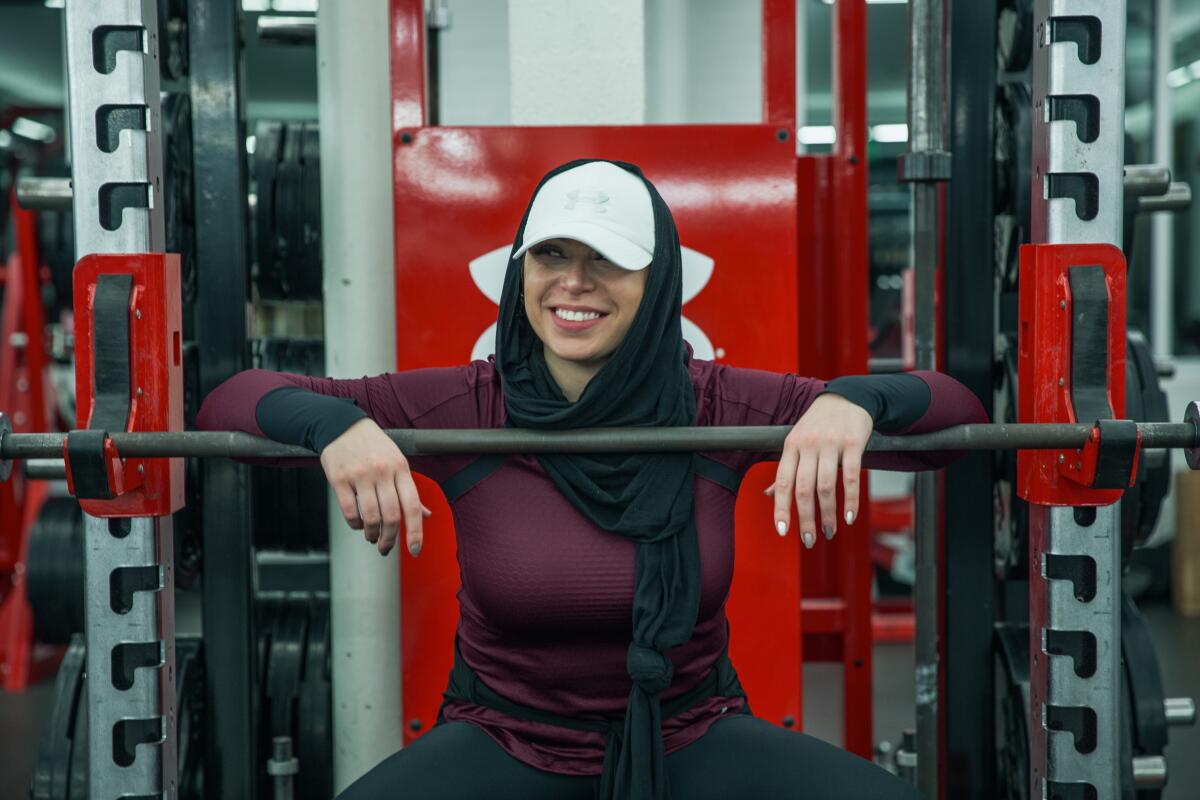
How to hydrate
A good strategy to prevent dehydration is to think about how much water your body needs in a regular day — and to make sure you get a similar amount of water between sunset and sunrise.
It doesn’t need to be a gallon, like Kubba, but for some, it amounts to drinking one or two glasses of water between each of the nightly prayers.
“If people have a hard time with water, they can add some lemon to it, or have some seltzer or teas,” Khan said.
Other tips to minimize thirst:
- Avoid high-sodium food and fried foods. Too much poultry can also make you thirsty, Haddad said.
- Drink liquids with electrolytes, such as coconut water, bone broth and sugar-free Gatorade.
- Don’t gulp the water. Drink it slowly and steadily through a straw.
- Eat foods with a lot of water content, including watermelon, cucumber, zucchini, yogurts, broths, nuts, seeds and dates.
- Try hydrated chia seeds, Naely said. You can soak them in water or almond milk overnight.
The best way to tell if you’re dehydrated is the color of your urine. It should be light yellow or clear, so if it’s too dark, increase your fluid intake. If you’re showing signs of dehydration and fatigue, Naely recommends electrolyte supplements such as Nuun Sport.
The humble date holds a special significance for Muslims as well as farmers in Southern California’s Coachella Valley -- considered the date capital of the United States
Don’t neglect sleep
It’ll be a challenge to get enough sleep if you’re waking up before sunrise, eating after sunset and doing nightly prayers.
In Muslim countries, entire schedules will shift to later hours during Ramadan. But in the U.S., many people will be expected to keep their regular routines.
Maintaining a normal sleep schedule is crucial, Naely said. It also helps regulate hormones that might cause you to feel hungry and then overeat.
And if you can, take naps. “Not gonna lie, during lunch break, sometimes I just go to my car and I take a nap,” Naely said. “People who work from home are lucky because they can just go to their bed and take a nap. A 30-minute power nap is fantastic.”
Some people will just stay up all night during Ramadan and sleep during the day. Malik doesn’t recommend this, but admits it’s probably OK short term.
“If you speak to someone coming from a religious perspective, that’s not the purpose of the month,” she said, laughing. “It’s about sacrifice, not sleeping while you’re supposed to be fasting. It’s better to maintain your normal routine.”
How and when to exercise
Just as Ramadan is not the right time to start a new diet, it’s also not the right time to start a new exercise regimen.
“Stick with what you know and take it easy,” said Naely. “Basically, all forms of movement are going to be good for you.”
When to exercise can depend on your fitness level and what type of workout you’re doing.
Haddad, who is Christian but was part of the mostly-Muslim Syrian national table tennis team as a teenager, remembers practicing even earlier in the morning so they could eat beforehand and have an effective workout. Others might prefer to work out right before iftar, so they can break fast immediately afterward.
However, doing too much cardio or strength training after an entire day of fasting could lead to fatigue and dizziness.
“I recommend waiting until after you’ve broken your fast, and you’ve eaten, so you have more energy to work out,” Naely said. “Make sure you have a carb beforehand for energy. And then post-workout you want to have a carb to replenish the glycogen your body used and a protein to help with muscle recovery.”
Or just keep it light.
“Flexibility exercises like yoga or Pilates or light cardio — walking — don’t require a lot of energy, so they can be done any time you’re able,” Khan said.
Fasting is a ritual practiced by all religions.
Minimize mood swings
Even if you follow all these best practices, you’ll still get hungry and cranky.
“The goal is that when you do start feeling hungry or hangry, it’s closer to the time where you can break fast, versus in the morning or midday,” Khan said.
Malik blames most mood swings on carbs. “Those emotional swings are triggered by the glucose swing,” she said. “If you have too many carbs, you have a quick glycemic response, because carbs become glucose quicker than protein.”
When you do get hangry, try distraction. Take a power nap. If it’s not so hot outside that the sun will dehydrate you, take a quick walk. The Vitamin D and endorphins could help, Naely said.
Or practice gratitude.
“Ramadan is meant to be a time, again, of reflection, discipline and also gratitude for our blessings,” Khan said. “And also acknowledging that we are fortunate that we can break our fast with a beautiful meal with family and friends. Not everyone has that opportunity or privilege.”
About The Times Utility Journalism Team
This article is from The Times’ Utility Journalism Team. Our mission is to be essential to the lives of Southern Californians by publishing information that solves problems, answers questions and helps with decision making. We serve audiences in and around Los Angeles — including current Times subscribers and diverse communities that haven’t historically had their needs met by our coverage.
How can we be useful to you and your community? Email utility (at) latimes.com or one of our journalists: Jon Healey, Ada Tseng, Jessica Roy and Karen Garcia.
More to Read
Sign up for The Wild
We’ll help you find the best places to hike, bike and run, as well as the perfect silent spots for meditation and yoga.
You may occasionally receive promotional content from the Los Angeles Times.

